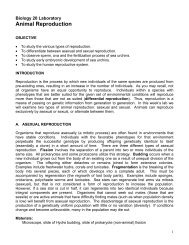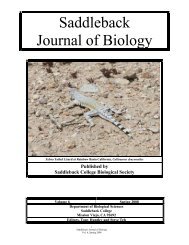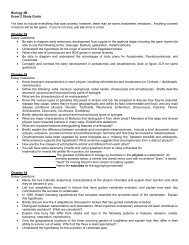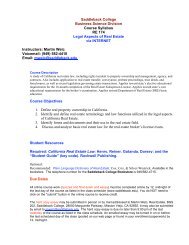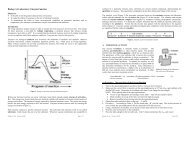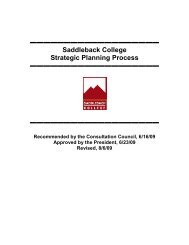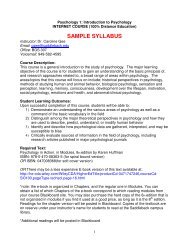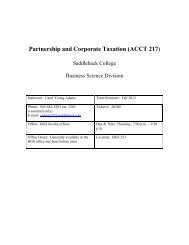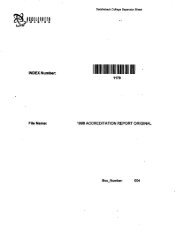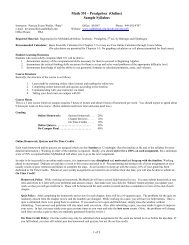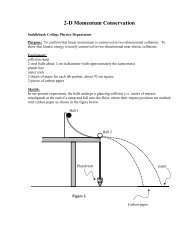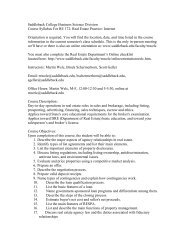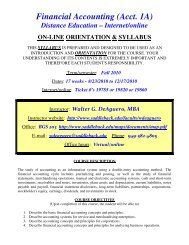Saddleback Journal of Biology - Saddleback College
Saddleback Journal of Biology - Saddleback College
Saddleback Journal of Biology - Saddleback College
You also want an ePaper? Increase the reach of your titles
YUMPU automatically turns print PDFs into web optimized ePapers that Google loves.
Fall 2009 <strong>Biology</strong> 3B Paper<br />
120<br />
Blood Glucose level (mg/dL)<br />
100<br />
80<br />
60<br />
40<br />
20<br />
0<br />
Glucose 1 Glucose 2 Glucose 3 Glucose 4<br />
Figure 2: There was no difference in average blood glucose levels between all four glucose tests. An ANOVA test<br />
revealed that there was no significance in the differences between the glucose levels (p=0.417).<br />
Discussion<br />
The overall outcome shows that exercising<br />
before a task that requires concentration and<br />
memorization will indeed increase the memory<br />
capacity <strong>of</strong> the participating subject. There was a<br />
significant difference between the pre-exercise memory<br />
test and the post-exercise memory test (Figure 1). This<br />
conclusion came from extensive study on the effects <strong>of</strong><br />
exercise on memorization in participants.<br />
Blood glucose levels in participants did not<br />
significantly change throughout the experiment at the<br />
four glucose test points (Figure 2). These results<br />
conflict with those found by Wahren, Felig and<br />
Ahlborg, which stated that blood glucose levels<br />
increase significantly after strenuous exercise (1974).<br />
This could be due to the production <strong>of</strong> epinephrine that<br />
occurs with stress, which is delivered through exercise.<br />
The epinephrine causes the heart to pump faster<br />
allowing blood to travel at a faster rate throughout the<br />
body. Thus, causing blood to reach the brain at a faster<br />
rate. In 1998, Korol and Gold found that memory can<br />
be enhanced through the release <strong>of</strong> epinephrine. Since<br />
the subjects being tested fit in to this category, this<br />
could explain the findings. The increase <strong>of</strong> memory<br />
could have also been attributed to the dilation <strong>of</strong> blood<br />
vessels that occurs with exercise, allowing more blood<br />
and oxygen to reach the brain.<br />
There is no evidence from this study that<br />
supports the connection between blood glucose and<br />
memorization. However, the study suggests that<br />
exercise increases memorization, as there was an<br />
overall improvement in the memory <strong>of</strong> the subjects<br />
after exercise. Based on the significance shown in this<br />
study <strong>of</strong> an increase in short-term memory due to<br />
exercise, this is an area that would greatly benefit from<br />
further research.<br />
Acknowledgements<br />
The investigators in this study would like to<br />
acknowledge Dee Conger Jr. for his donation <strong>of</strong> a<br />
Bayer One Touch Glucose Monitor, test strips, and<br />
lancets. They would also like to acknowledge the<br />
Astarabadi’s for use <strong>of</strong> their treadmill, and Pavilions<br />
Pharmacy for donation <strong>of</strong> test strips and alcohol wipes.<br />
Finally, the investigators would like to thank the<br />
participants <strong>of</strong> the study for their time and patience.<br />
Literature Cited<br />
Benton, David and Owens, Sarah S. 1993. Blood<br />
glucose and human memory. Psychopharmacology<br />
113:p. 83-88.<br />
Colombani, P; Wenk, C; Kunz, I; Krahenbuhl, S and<br />
Kuhnt, M. Arnold, M. Frey-Rindova, P. Frey, W.<br />
Langhans, W. 1996. Effects <strong>of</strong> L-carnitine<br />
supplementation on physical performance and energy<br />
metabolism <strong>of</strong> endurance-trained athletes: a double<br />
blind crossover field study. European <strong>Journal</strong> <strong>of</strong><br />
Applied Physiology73: p. 434-439.<br />
125<br />
<strong>Saddleback</strong> <strong>Journal</strong> <strong>of</strong> <strong>Biology</strong><br />
Spring 2010



